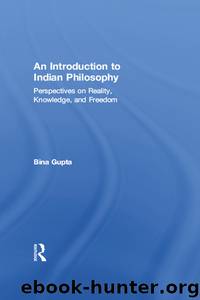An Introduction to Indian Philosophy by Gupta Bina

Author:Gupta, Bina
Language: eng
Format: epub
Publisher: Taylor & Francis
Viśeṣa (Particularity)
Things not only are experienced as being alike, they are also perceived as being different, and even when they share the same qualities they are distinct, e.g., though all the cows have cowness, one cow is different from another cow. Viśeṣa is an entity, again a real entity, which accounts for this ultimate distinctness of individuals. The use of such indexicals as “this” or “that,” does not explain individuality, but presupposes it. Therefore, we need a new category to explain individuality of entities.
The first attempt is to explain individuality by some quality (or guṇa) of an individual thing. But two things may have all the same qualities, e.g., twins, but they are still distinct. Could each one's distinctness be due to the stuff it is made of, its “matter” (a position which Aristotle held)? But then we are led to ask, what distinguishes the stuff of the one from the stuff of the other identical twin? We may ask, what distinguishes one atom from another? The Vaiśeṣika answer is: Each otherwise non-distinguishable partless particular possesses its own particularity, which is a real entity as much as the universals are. The particularity of wholes is accounted for by the particularities of its parts, but when we come to further partless entities the same explanation won't do; we have to stop somewhere in order to avoid an infinite regress and recognize a new real feature, its own particularity, only for individuals that do not possess parts. Each atom (also each soul) has its own particularity. So the Vaiśeṣika argues that particularity is the unique individuality of the eternal substances, e.g., space, time, ether, minds, souls, and atoms of earth, water, fire, and air.
It is worth noting that “particularity” is not a universal feature of distinct particulars. Ordinary objects of the world, for example, pitchers, tables, and chairs, are made up of parts, and so do not require particularity to explain them. Particularity is required to explain the differences among the partless eternal substances. The particularity of an atom or of a soul is not perceived, but inferred. Furthermore, to regard particularity as a universal would be self-contradictory, it would contradict the very sense of “particularity.”
Download
This site does not store any files on its server. We only index and link to content provided by other sites. Please contact the content providers to delete copyright contents if any and email us, we'll remove relevant links or contents immediately.
| Historic | Information Systems |
| Regional |
Man-made Catastrophes and Risk Information Concealment by Dmitry Chernov & Didier Sornette(5993)
The Revenge of Geography: What the Map Tells Us About Coming Conflicts and the Battle Against Fate by Kaplan Robert D(4064)
Zero Waste Home by Bea Johnson(3829)
COSMOS by Carl Sagan(3615)
Good by S. Walden(3543)
In a Sunburned Country by Bill Bryson(3526)
The Fate of Rome: Climate, Disease, and the End of an Empire (The Princeton History of the Ancient World) by Kyle Harper(3051)
A Wilder Time by William E. Glassley(2853)
Camino Island by John Grisham(2790)
Organic Mushroom Farming and Mycoremediation by Tradd Cotter(2681)
The Ogre by Doug Scott(2674)
Human Dynamics Research in Smart and Connected Communities by Shih-Lung Shaw & Daniel Sui(2490)
Energy Myths and Realities by Vaclav Smil(2480)
The Traveler's Gift by Andy Andrews(2447)
9781803241661-PYTHON FOR ARCGIS PRO by Unknown(2361)
Inside the Middle East by Avi Melamed(2347)
Birds of New Guinea by Pratt Thane K.; Beehler Bruce M.; Anderton John C(2247)
A History of Warfare by John Keegan(2230)
And the Band Played On by Randy Shilts(2183)
